
Lottery is a form of gambling where participants purchase tickets, usually for a dollar each, select numbers, and hope that their number or group of numbers will be randomly drawn. It’s often used in public policy settings when a scarce resource, such as units in a subsidized housing block or kindergarten placements, needs to be distributed fairly. The most common lottery is the financial variety, where people buy tickets to win big cash prizes.
Lotteries are a fixture of American life, with people spending upward of $100 billion in 2021 on tickets. Supporters argue that the games are an easy way to raise money without imposing onerous taxes on the poor, while opponents criticize them as a regressive tax on working-class people.
The first recorded lotteries were held in the Low Countries in the 15th century to raise funds for town fortifications and help the poor. The earliest American lotteries were launched in the eighteenth and nineteenth centuries, as states struggled to build a new nation and its banking and taxation systems were still evolving. American leaders like Thomas Jefferson and Benjamin Franklin endorsed them as a quick way to raise capital for public projects, such as building roads and buying cannons for Philadelphia.
Today, state governments make up the majority of the world’s lotteries and are responsible for selling a wide range of products. These include instant-win scratch-off games and regular games that require players to pick a series of numbers or symbols, such as the five white balls in a Powerball drawing. There are also lottery-like games in sports, such as the NHL draft, which is determined by a random draw. The winnings from these games are sometimes lumped together to create a single, larger prize.